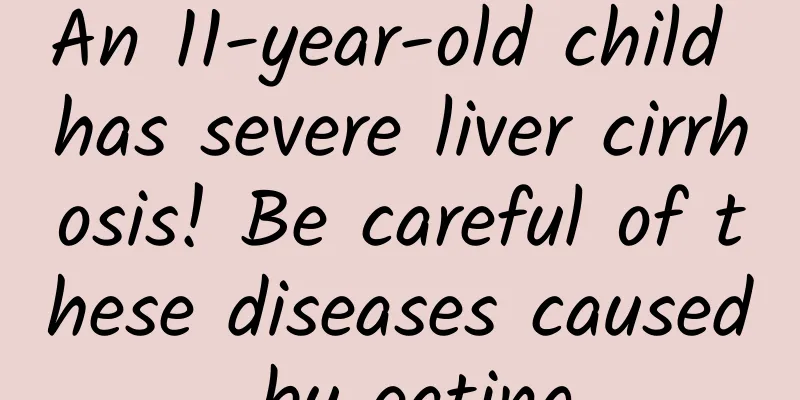An 11-year-old child has severe liver cirrhosis! Be careful of these diseases caused by eating

|
Can you imagine an 11-year-old child being diagnosed with severe liver cirrhosis? How could he be suffering from this disease at such a young age? 01 11-year-old boy develops severe liver cirrhosis due to eating too much Xiaolin is 11 years old. During the school physical examination last year, his transaminase level was found to be elevated. His parents were worried that their child was infected with hepatitis B, so they took him to the hospital for further examination. The test results shocked both parents: Xiaolin had moderate fatty liver, and the right lobe of his liver reached 148mm, which was larger than the size of a normal human liver. After a year of recuperation, the follow-up ultrasound showed that Xiaolin's fatty liver had turned into mild fatty liver. Although the data has improved, Xiaolin looks much fatter than last year. In order to ensure the child's health, the doctor suggested that the parents take the child to do a liver puncture. The examination actually found that Xiaolin suffered from severe liver cirrhosis! Xiaolin's parents couldn't believe how an 11-year-old could have severe liver cirrhosis. In their eyes, Xiaolin was a very healthy child who could eat and drink, was chubby, had thick eyebrows and big eyes. After the doctor examined the child, he found that the child's severe liver cirrhosis was related to bad eating habits. The child had a large appetite and a strong taste since childhood. He also liked to eat braised pork and other meats. The family thought that it was a good thing for the child to be able to eat, so they never controlled the child's diet. As he grew up, the child's appetite became bigger and bigger, and he always ate until he was full! Generally speaking, alcoholic cirrhosis is the most common cause of liver cirrhosis, but the proportion of non-alcoholic cirrhosis is also increasing year by year, mostly due to improper diet control. For example, long-term overeating like Xiaolin caused obesity, which led to liver cirrhosis. 02 Beware of these childhood diseases caused by eating Gastrointestinal disease When it comes to diseases caused by "eating", the most direct one may be gastrointestinal disease in children. Children who are still growing and developing usually have weak gastrointestinal tracts. If they do not pay attention to healthy diet, they can easily develop various gastrointestinal diseases. Fast food, fried food, carbonated soda, snacks... Many children prefer these foods and drinks to their regular meals. Long-term and large-scale consumption can easily stimulate excessive secretion of gastric acid and pepsin, placing a heavy burden on the stomach and causing gastrointestinal diseases. In addition, some children are picky eaters, have partial eating habits, and have irregular eating habits, which greatly increases their chances of developing stomach problems. Obesity According to the chief nutritionist at the Chinese Center for Disease Control and Prevention, the overweight and obesity rate among children and adolescents aged 6-17 in my country is nearly 20%, and the overweight and obesity rate among children under 6 years old is over 10%! Childhood obesity will not only have a serious impact on their current physical development, but also increase the risk of obesity-related chronic diseases in adulthood. Excessive sugar intake is one of the causes of childhood obesity. Highly sweet foods can easily make children addicted, causing them to lose control over their food intake and consume too much without realizing it. A high-sugar diet increases the risk of overweight and obesity, and is also a risk factor for childhood diabetes and cardiovascular disease. Sugar that the human body cannot absorb will be converted into glycogen and stored in the body, providing the body with most of the calories it needs, so there is rarely a need to burn fat to supply energy. If fat is not burned, it will accumulate in the body and cause weight gain. gout It is not just the middle-aged and elderly people who are suffering from gout. The age at which gout develops is currently decreasing year by year, and it is also not uncommon among teenagers. Winter is about to begin, which is the time to nourish the body. Many parents will cook large amounts of meat and make soup for their children to supplement their nutrition. This method is very likely to cause gout. Because the purine content in broth is very high, drinking it frequently in a short period of time may cause the purine content in the body to increase rapidly, thereby increasing the level of uric acid in the blood and inducing gout. However, the main reason is still due to abnormal purine metabolism, so it is okay to drink broth, but it must be light, low in salt and oil, and do not drink it frequently or multiple times. In addition, overweight children are 50% more likely to suffer from gout than other children of the same age. Long-term high-purine, high-sugar, and high-fat diets make it easier for them to have high uric acid levels in their bodies during metabolism, thereby inducing gout. 03 Children's healthy diet is inseparable from these points A balanced diet is the basis for ensuring the nutritional needs and health of the human body to the greatest extent, and food diversity is the basic principle of a balanced diet. Daily meals should include cereals, vegetables, fruits, livestock, poultry, fish, eggs, milk, soybeans, nuts, etc. It is recommended to consume at least 12 kinds of food per day and 25 kinds per week. Vegetables and fruits are important sources of vitamins, minerals, dietary fiber and phytochemicals. Milk and soy products are rich in calcium, high-quality protein and B vitamins. Nuts are beneficial supplements to the diet. It is recommended to have vegetables at every meal and eat fruits every day. To meet the needs of bone growth, it is necessary to ensure that 300MI of milk and dairy products or an equivalent amount of dairy products are consumed every day, soy products are eaten frequently, and nuts are eaten in moderation. Fish, poultry, eggs and lean meat can provide the high-quality protein, vitamin A, B vitamins, etc. needed by the human body. Some also contain high fat and cholesterol. It is recommended that fish and poultry be given priority as animal foods, as they have a relatively low fat content. Fish contains more unsaturated fatty acids. Eggs have a full range of nutrients. When eating livestock meat, choose lean meat, which has a low fat content. Eat less or no smoked or cured meat. We should develop the habit of a light diet, with less salt, oil and sugar. The daily intake of salt per person should not exceed 5 grams, cooking oil should be 25-30 grams, and the added sugar should not exceed 50 grams. It is best to control it below 25 grams. The digestive system structure and function of children and adolescents are still in the development stage. Eating three meals a day in a reasonable and regular manner is the basis for cultivating healthy eating behavior. They should eat a light diet, eat less outside, and eat less fast food high in energy, fat or sugar. The time of three meals a day should be relatively fixed, with regular and quantitative meals, and chewing slowly during meals. The energy provided by breakfast should account for 25%-30% of the total energy of the day, lunch should account for 30%-40%, and dinner should account for 30%-35%. Eat breakfast every day and make sure it is nutritious enough. It should include at least three of the following types of food: cereals and potatoes, meat and eggs, milk and beans, milk and its products, and fruits and vegetables. Lunch plays a connecting role in the day, so eat enough and eat well. Dinner should be moderate. Eat less fast food that is high in salt, sugar or fat. If you have to eat fast food, try to choose fast food with vegetables and fruits. Drink enough water, drink small amounts and multiple times a day. Children aged 6 to 10 should drink 800-1000 ml a day, and children aged 11 to 17 should drink 1100-1400 ml a day. Drink more water when the weather is hot or when you sweat a lot during exercise. Drink water in small amounts and multiple times, and don't drink when you feel thirsty. You can drink about 100-200 ml of water during each break. Choose hygienic and nutritious food as snacks; fruits and fresh vegetables that can be eaten raw, milk, soybeans and their products, nuts can all be used as snacks. Fried, high-salt or high-sugar foods are not suitable for snacks. The amount of snacks you eat should not affect your main meals. You can eat a small amount of snacks between meals, but you cannot use snacks to replace main meals. You should not eat snacks within 30 minutes before or after a meal. Do not eat snacks while watching TV or playing. Do not eat snacks 30 minutes before going to bed. Brush your teeth or rinse your mouth in time after eating snacks. Most beverages contain a lot of added sugar. Try to drink less or no sugary drinks, and never replace drinking water with drinks. Learn to check the nutritional information on the product label and choose drinks with low "carbohydrate" or "sugar" content. Do not drink alcohol. The organs of children and adolescents are not fully developed yet. Drinking alcohol at this time will cause serious damage to the body. Even if they drink a small amount, their attention, memory, and learning ability will decline, and their thinking will be slow. In particular, children and adolescents have a low ability to detoxify alcohol. Drinking alcohol can cause headaches at the mildest, coma or even death at the worst. Being picky about food and over-dieting can easily lead to malnutrition. Overeating will cause excessive intake of food in a short period of time, which will increase the burden on the digestive system and increase the risk of becoming overweight or obese. Overweight and obesity not only affect the health of children and adolescents, but are also more likely to continue into adulthood, increasing the risk of chronic diseases. Avoid blind dieting or extreme weight loss methods. Follow the rules of eating and eat slowly; younger children can use smaller tableware to help them form a habit of eating in fixed quantities. Parents should develop reasonable eating habits, set an example, and encourage their children's healthy eating behaviors. Partial eating and picky eating behaviors should be discovered and corrected early, the food structure should be adjusted, food diversity should be increased, and children's acceptance of food should be improved. In fact, what we parents can do is to provide nutritious and varied meals, and try to correct our bad eating habits to prevent affecting our children. The family table needs nutrition, science, health and respect. Such meals are full of love, and children will thrive after eating them! Source: Capital Education, Global Times, Institute of Nutrition and Health, Chinese Center for Disease Control and Prevention, Life Times |
<<: How to use the Xiaotiancai phone watch? What are the features of the phone watch?
>>: What do online games do to our brains?
Recommend
Causes of high prolactin in women
High prolactin is extremely complicated. It is a ...
Does cesarean section with anemia cause heavy bleeding?
Women are very likely to suffer from anemia due t...
Can early pregnancy test strips test amniotic fluid?
You can also use early pregnancy test paper to te...
Will yellow leucorrhea affect pregnancy?
Leucorrhea is the secretion from the female vagin...
Can pregnancy cause hypothyroidism?
Pregnancy will cause changes in a woman's bod...
What to do if the cervix is eroded and enlarged
Women are often confused by cervical erosion. Man...
What does watery leucorrhea look like and how to treat it
Leucorrhea refers to a liquid secreted from the f...
Can I drink alcohol if I have pneumonia? Why can't I eat seafood if I have pneumonia?
As the year draws to a close, there have been sev...
Low immunity? Don’t worry! Massaging acupoints can improve immunity
This is the 3808th article of Da Yi Xiao Hu The r...
Causes of stomach pain before menstruation
Period is what we often call menstruation. During...
Is orange seed effective in treating breast hyperplasia?
Breast hyperplasia is a problem that many women n...
Causes of abdominal pain in women
I believe everyone knows the importance of our lo...
What is the difference between Queshe and Maojian? How to brew Maojian tea
Maojian has a mellow and sweet taste, elegant aro...
I will get two bars when my period comes.
Will I get two bars when my period is coming? Pre...
Building a pathway between feelings
All senses are related, and this phenomenon is ca...









